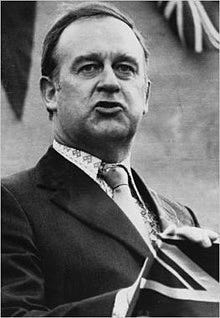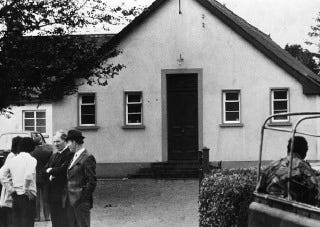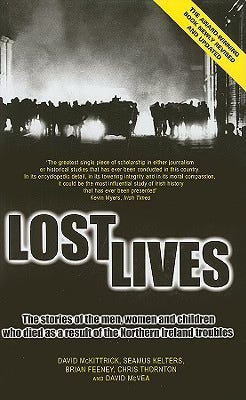On a day when an assassination attempt on President Trump was news all around the world, September 1975 also saw an assassination attempt on a US President when Lynette “Squeaky” Fromme tried to shoot him in Sacramento, California. Before being restrained by Secret Service agent Larry Buendorf. As she was apprehended, she reportedly yelled "It wouldn't go off" and said "It didn't go off. Can you believe it? It didn't go off" when brought to the ground by Buendorf.
Political Developments in September 1975
On the 2nd of September, at a conference held in the United States, representatives of the UDA indicated their organisations' support for an independent Northern Ireland.
A Chairman’s meeting was held on the 3rd of September, separately, with representatives of the UUUC, Ian Paisley, and the SDLP. During the meeting with the SDLP, it was stated that;
The Chairman indicated the general tone and content of the talks and said that while UUUC negotiators had asked him to prepare an agenda for a discussion on the proposal for a temporary voluntary coalition, he was aware of considerable resistance with the UUUC to the idea. The UUUC negotiators had told him it was still worth investigating the possibilities. He had told UU simply that the SDLP were interested enough to discuss the proposition, that they had by no means assented totally, and that their engagement in talks was contingent on being able to get what they regarded as 'copper-fastened guarantees'
The following day, the “Voluntary Coalition Solution” was Drawn up. There were 9 key points;
The attached paper forms the agenda for a discussion on the above solution. It does not purport to specify all the terms and each negotiating team may wish to discuss some aspects with me in order to seek clarification before putting the paper to its own party. I hope to receive some pointers from the teams in relation to the questions raised in paragraph 5 of the agenda. This will help me to draw up an outline draft scheme for closer consideration.
There is, of course, a wider aspect. I refer to the entire machinery of devolved government. There are also points within the scope of voluntary coalition not covered by paragraph 5 and I shall carefully note any which are mentioned to me. The object at present is to see whether broad agreement is possible and the immediate need is to concentrate on the voluntary coalition idea. In presenting a flexible agenda I want to give the parties a chance of making, and not merely considering, suggestions which might form part of a draft scheme. May I now venture to make a few observations based on the negotiations and my own thinking so far.
Every member and party in the Constitutional Convention recognises that Northern Ireland needs, and needs quickly, an executive government, legislature and institutions which will restore and preserve stable government, tackle the present economic crisis, which involves special problems for Northern Ireland arising from its geographical position and the disastrous impact of the civil disturbances, and secure peace in a law-abiding community. These objectives serve the common interest of all and can best be achieved, for the benefit of the entire community regardless of religious or political views, if they have the goodwill and active support of every law-abiding member of the community and all the political parties.
Some members, particularly those in the SDLP, believe that political power in Northern Ireland, which confers the ability to protect and assist the under-privileged and to take part in decisions as to the shaping of the future of the Province, ought, for a considerable period at least, to be shared at executive level by the parties which command substantial electoral support at the polls. Such members believe that this need, which modifies the ordinary democratic principle of government, springs from the fact that in Northern Ireland only one political party or group, namely that of broadly Unionist sympathies, has commanded or is in the short term likely to command the degree of support which would enable an executive government to be formed. Therefore the swing of the pendulum which is regarded as a normal feature of parliamentary domocracy is lacking in Northern Ireland. These members also recognise that the need (in which they believe) for simultaneous, as distinct from alternate, power sharing may disappear in time, if Northern Ireland's political institutions develop on lines different from those along which they have travelled in the past.
Other members, who mainly belong to UUUC, consider majority government, as reflected in the composition of the executive, to be in accordance with a basic principle of parliamentary democracy. These members therefore reject the principle of institutionalised power sharing at executive level. At the same time, based partly but not entirely on the special political situation in Northern Ireland, they consider that the power of Parliament to influence and scrutinise the policy and actions of the executive government ought to be strengthened and, to this end, the UUUC has proposed the creation and statutory entrenchment of Committees of the Northern Ireland Parliament which would be subject to the ultimate control of that Parliament and whose functions and powers would enable them to scrutinise the actions of Government and Government departments, to send for papers and persons, including Ministers, and to originate and comment on proposed legislation. A majority of the Chairmen of such Committees would be drawn from the ranks of the Parliamentary opposition and the proposal for Committees is quite independent of the coalition proposals.
There is, however, a great deal to be said for the propositions (1) that the Province is faced with an economic, political and security crisis and (2) that, if a programme of measures and policies (including policy in the vital area of security) can be widely agreed, the crisis can be dealt with much more effectively to the benefit of the entire community. The existence of a crisis and the need to devise a broadly based programme to meet it create the situation in which it may be appropriate to consider a voluntary coalition government. This kind of rule is consistent with the ordinary principles of democratic parliamentary government. Any Parliament and Government which is contemplated ought to be equipped with wide powers. These are necessary in order that a new Northern Ireland Parliament should be in a position of sufficient confidence and strength and that it may be able to deal successfully with the crisis which has developed in such a menacing fashion over the years.
It has been proposed for consideration that without sacrifice of principle on either side a voluntary coalition can and should be formed and that coalition government should continue for a period which might realistically be regarded as proportionate to the magnitude of the crisis and the nature and timing of the necessary remedies. It can be strongly argued that an economic plan is needed and also that the restoration of peace and political stability can best be achieved during a period when ideological controversy as to forms of government is by mutual consent suspended in the Parliamentary sphere.
Without speculating as to the probable response of the Government and Parliament to a Convention report based on a majority view, it is reasonable to assume that an agreed report has a much greater chance of full acceptance and speedy implementation. In the present state of Northern Ireland, this is clearly an important consideration for all parties as well as for the people.
The continued surges of violence make it more difficult to negotiate and think calmly and can cause people who have painstakingly built up an atmosphere of trust to drift apart. This is exactly what all the terrorists want us to do. The IRA and Provisional Sinn Fein have sworn to wreck the Convention. Let us remember that this violence is their way of trying to achieve that objective and let us not fall into their trap. The recent shocking events should not weaken but strengthen the resolve to seek an honourable agreement.
On the 8th of September, during a United Ulster Unionist Council meeting, William Craig was the only member to vote for a voluntary coalition with the SDLP.
The next day, William Craig sent a letter to Cecil Harvey, Chief Whip of the Vanguard Unionist Party, discussing the voluntary coalition with the SDLP.
Dear Cecil,
I have considered some of the very grave consequences. which must follow the acceptance by the Convention Coalition of Dr Paisley's motion which excludes the SDLP regardless of policy or circumstances from participation with the UUUC
in a Coalition Government. I cannot say that such a Coalition would ever have come into existence because I do not know whether the SDLP would have supported the UUUC proposals for the return of a Northern Ireland Parliament and Government, and if so, whether they would have served in a UUUC majority government on the basis of a strong law and order policy together with social and economic policies of reconstruction. I do know that SDLP were prepared to seriously and sincerely examine our proposals including a strong law and order policy under the control of a Northern Ireland Parliament and Government. For my part, I entered these discussions honestly and sincerely seeking agreement and I know that SDLP recognised that I did so whilst committed firmly and rigidly to the principles of the British Parliamentary Government. The fact that the SDLP have done so notwithstanding their own sincere but opposing convictions is a gesture for the good of the Province and deserved better from us. It is difficult to see how the SDLP can continue to explore our proposals in a search for an agreement. If the position is not retrieved then, to put it at the very minimum, the UUUC have devalued the Convention.
From public records that were released in January 2006, there was a note (dated 19th of September) that discussed the ongoing developments concerning the Constitutional Convention. Although it’s not clear who had written the note, or its intended recipients, the key takeouts were as follows;
Mr Craig appears to some as a knight in shining armour. The fact is his aims were - and still are - simple: to get a devolved government which would control security policy as quickly as possible, on the basis of a gentleman’s agreement that the SDLP would participate in government for a year or two. This would present HMG with some formidable problems.
It would be over-optimistic to believe that the support subsequently given to Mr Craig, or the split in Loyalist ranks (which has been widened by Mr Powell’s attack on the chairman), is likely to lead to the overturning of the decision of 8 September, but the situation is still fluid.
The Convention Business Committee has now agreed that each party should submit its own proposals to the convention for debate, and it is envisaged that these and the views on them will all be reflected in the final report. This process may take several weeks.
British Prime Minister Harold Wilson, together with Secretary of State for Northern Ireland Merlyn Rees, held a meeting with Conservative Party leader Margaret Thatcher on the 11th of September to brief her about several matters including Northern Ireland. On the 3rd of May 2006, the Irish News (a Belfast-based newspaper) published details of confidential cabinet minutes that had been taken at the meeting. The minutes revealed that the British government was aware of collusion between the security forces, particularly the Ulster Defence Regiment, and Loyalist paramilitaries.
Shootings in September 1975
01/09/75 - Five Protestant civilians, James McKee (70), Ronald McKee (40), John Johnston (80), Nevin McConnell (40) and William Herron (63), died and seven were injured as a result of a gun attack on an Orange Hall in Newtownhamilton, County Armagh. Responsibility for the attack was claimed by a group called the South Armagh Republican Action Force which was considered by many commentators to be a cover name for members of the IRA.
01/09/75 - Denis Mullen (36), then a member of the SDLP, was shot dead at his home near Moy, County Tyrone.
01/09/75 - Thomas Taylor (50), a Protestant civilian, was shot dead by Republican paramilitaries at his place of work in Donegall Street, Belfast.
01/09/75 - Protestant civilian Leslie Shepherd (24) was shot dead, in a case of mistaken identity, by the UVF at a scrap metal yard near Glengormley, County Antrim. The intended targets were the Catholic owners of the business.
01/09/75 - The bodies of two members of the UDA were found buried on wasteland in the Gobbins, Islandmagee, County Antrim. They had been abducted on the 7th of April 1975 and killed by the UVF in a feud between the two Loyalist paramilitary groups.
02/09/75 - Civilian John Cathcart (37) was shot at his workplace, National Tyre Company, Frederick Street, Belfast.
03/09/75 - Catholic civilians, a father and daughter, William Hamilton (63) and Patricia McGrenaghan (34) were shot dead at their home by Loyalist paramilitaries in Higtown Road, Belfast.
04/09/75 - The UVF launched a gun and bomb attack on McCann's Bar in Ballyhegan. Eleven people were wounded and Catholic civilian Margaret Hale (33) died from her wounds on the 22nd of September. The attack has been linked to the Glenanne Gang.
06/09/75 - An INLA unit attacked Rosemount RUC station in Derry. The station came under sustained fire for approximately fifteen minutes.
07/09/75 - The UVF shot dead one of its members, Robert McCreight (21), on a farm near Templepatrick. It claimed he was an informer.
08/09/75 - UDA member Andrew Craig (20) was shot dead by the IRA at the corner of Alfred and Russell streets, Markets, South Belfast.
09/09/75 - Civilian George Quinn (41) was found shot near Turf Lodge roundabout, Springfield Road, Belfast.
11/09/75 - INLA members fired several shots at the car of a UDR soldier at the Shambles Yard, Armagh. He was not hit but was injured by glass splinters.
12/09/75 - Civilian John Snoddy (32) was shot at his home, Milltown Avenue, Derriaghy, near Belfast.
13/09/75 - Civilian Leo Norney (17) was shot while walking along Shepherd’s Path, near Turf Lodge, Belfast.
13/09/75 - The INLA claimed two British soldiers were injured during an attack on a mobile patrol in the Shantallow area of Derry. The RUC claimed no shooting incident occurred.
14/09/75 - Civilian Seamus Hardy (20) was found shot in an entry, off Columbia Street, Shankill, Belfast.
18/09/75 - The UDA shot dead Catholic civilian Brendan Doran (29) in his newsagent's shop at Greenway, Belfast.
Bombings in September 1975
05/09/75 - The IRA exploded a bomb at the Hilton Hotel, Park Lane, London and killed two people, Robert Lloyd and Grace Lodhuis (39), one English and one Dutch, and injured a further 63. It was later established that a 20-minute warning had been given but this was not passed on to the hotel. At 11:55 am the Daily Mail received a telephone warning and passed it to Scotland Yard. Three police officers were sent to the hotel and were speaking to security staff when the bomb exploded at 12:18 pm.
10/09/75 - Civilian Michael O’Toole (41) died two days after being injured by a booby trap bomb attached to his car, outside his home, Coast Road, Larne.
12/09/75 - Two British soldiers, a major and a private, were injured by an INLA bomb in the Whiterock area of Belfast.
15/09/75 - A person was injured by a postal device at Chilcott Avenue, and another person was person was injured by a similar device at Alcan Aluminium Ltd in London.
22/09/75 - There was a series of bomb attacks on towns across Northern Ireland. The IRA claimed responsibility for some of the attacks thus putting further strain on the truce. Many commentators considered that the truce was effectively over by this time.
22/09/75 - Three people were injured when an IRA time bomb exploded outside the Portman Hotel in London's West End.
25/09/75 - Two policemen were injured when a device exploded at the Hare and Hounds public house in Kent.
25/09/75 - A bomb exploded outside a bank in High Holborn, London, no injuries were reported.
29/09/75 - Seven people were injured in an IRA bomb attack in Oxford Street, London.
Thanks very much for reading. I hope you found it interesting and will come back on Tuesday!
I appreciate everyone who recently hit that heart icon ❤️ at the bottom. It makes it easier for other people to find this newsletter.
Thanks for the support!
If you’d like to let me know what you thought of today’s instalment, feel free to leave a comment below.
Some recommended reading based on research for this instalment.
I.N.L.A. - Deadly Divisions by Henry McDonald and Jack Holland
The Provisional IRA in England: The Bombing Campaign 1973-1997 by Gary McGladdery.








